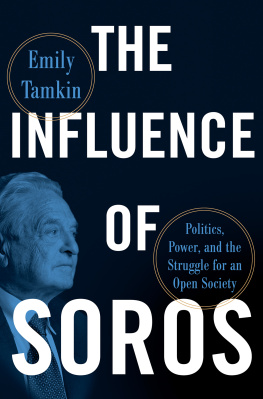Soros - In Defense of Open Society
Here you can read online Soros - In Defense of Open Society full text of the book (entire story) in english for free. Download pdf and epub, get meaning, cover and reviews about this ebook. City: New York, year: 2019;2019, publisher: PublicAffairs, genre: Politics. Description of the work, (preface) as well as reviews are available. Best literature library LitArk.com created for fans of good reading and offers a wide selection of genres:
Romance novel
Science fiction
Adventure
Detective
Science
History
Home and family
Prose
Art
Politics
Computer
Non-fiction
Religion
Business
Children
Humor
Choose a favorite category and find really read worthwhile books. Enjoy immersion in the world of imagination, feel the emotions of the characters or learn something new for yourself, make an fascinating discovery.

In Defense of Open Society: summary, description and annotation
We offer to read an annotation, description, summary or preface (depends on what the author of the book "In Defense of Open Society" wrote himself). If you haven't found the necessary information about the book — write in the comments, we will try to find it.
Soros: author's other books
Who wrote In Defense of Open Society? Find out the surname, the name of the author of the book and a list of all author's works by series.
In Defense of Open Society — read online for free the complete book (whole text) full work
Below is the text of the book, divided by pages. System saving the place of the last page read, allows you to conveniently read the book "In Defense of Open Society" online for free, without having to search again every time where you left off. Put a bookmark, and you can go to the page where you finished reading at any time.
Font size:
Interval:
Bookmark:
The Tragedy of the European Union
Financial Turmoil in the United States and Europe: Essays
The Soros Lectures at the Central European University
The Crash of 2008 and What It Means:
The New Paradigm of Financial Markets
The New Paradigm of Financial Markets:
The Credit Crisis and What It Means
The Age of Fallibility: Consequences of the War on Terror
Open Society: Reforming Global Capitalism
The Crisis of Global Capitalism: Open Society Endangered
George Soros on Globalization
Soros on Soros: Staying Ahead of the Curve
Opening the Soviet System
Underwriting Democracy
The Alchemy of Finance
Copyright 2019 by George Soros
Cover design by Pete Garceau
Cover image: Brendan Smialowski/AFP/Getty Images
Cover copyright 2019 Hachette Book Group, Inc.
Hachette Book Group supports the right to free expression and the value of copyright. The purpose of copyright is to encourage writers and artists to produce the creative works that enrich our culture.
The scanning, uploading, and distribution of this book without permission is a theft of the authors intellectual property. If you would like permission to use material from the book (other than for review purposes), please contact permissions@hbgusa.com. Thank you for your support of the authors rights.
PublicAffairs
Hachette Book Group
1290 Avenue of the Americas, New York, NY 10104
www.publicaffairsbooks.com
@Public_Affairs
First Edition: October 2019
Published by PublicAffairs, an imprint of Perseus Books, LLC, a subsidiary of Hachette Book Group, Inc. The PublicAffairs name and logo is a trademark of the Hachette Book Group.
The Hachette Speakers Bureau provides a wide range of authors for speaking events. To find out more, go to www.hachettespeakersbureau.com or call (866) 376-6591.
The publisher is not responsible for websites (or their content) that are not owned by the publisher.
Editorial production by Christine Marra, Marrathon Production Services.
www.marrathoneditorial.org
Library of Congress Cataloging-in-Publication Data has been applied for.
ISBN 978-1-5417-3670-2 (hardcover), ISBN 978-1-5417-3672-6 (ebook)
E3-20190907-JV-NF-ORI
To the Open Society Foundations and their grantees,
whose achievements have exceeded my expectations
I believe we are living in a revolutionary moment. As a result, practically anything is possible and fallibility reigns supreme.
Ive had a lot of experience with revolutionary moments. They play an important role in my conceptual framework, where I distinguish between far-from-equilibrium and near-equilibrium situations. They also played an important role in my life and in the life of my foundation.
My experience with revolutionary moments started when Nazi Germany occupied Hungary in 1944. I was not yet fourteen years old. By some measures, it started even earlier, when I used to join my father in the swimming pool after school and he would regale me with tales of his adventures in Siberia during the Russian Revolution of 1917. If I add my fathers reminiscences to my own experiences, I can claim to have a memory going back a hundred years.
Nineteen forty-four was the formative year in my life. One particular incident stands out in my mind. Adolf Eichmanns first act was to set up the Jewish Council, and as a schoolboy, I was sent there to act as a runner (Jewish children were forbidden to attend school). My first assignment was to deliver mimeographed notices to what turned out to be a list of lawyers whose names started with A and B to report to the Rabbinical Seminary with a change of clothes and food for twenty-four hours. Before delivering the notices, I went home to show them to my father, who was also a lawyer. He told me to deliver the messages but warn the recipients that if they reported, they would be deported. One lawyer told me that he had always been a law-abiding citizen and that they couldnt do him any harm. When I reported this to my father, he explained to me that in abnormal times the normal rules dont apply and people obey them at their peril. That became our mantra, and with his guidance all of us survived. He also helped many other people. That is what made 1944 a positive experience for me.
As regards the life of my Open Society Foundations, revolutionary moments were always important. I would mention the collapse of the Soviet system in the 1980s, which was the first time the foundation played a decisive role, and our role in Europe today, where we are trying to prevent the European Union from following the example of the Soviet Union.
In spite of the intellectual and emotional preparation, we are not exempt from the fallibility that rules supreme during revolutionary moments. We can react to events, but we cannot predict them. That means that we cannot have a firm strategy unless we call flexibility a strategy. I call it a tactic, and I endorse it. It allows us to study and prepare for various scenarios. In order to find something firm, we can rely only on our values and convictions. And that is what we are doing.
This book is entitled In Defense of Open Society, yet when I set up my foundation in 1979, it was not to defend open society but to promote it. For the next twenty-five years, repressive regimes like the Soviet Union were collapsing and open societies like the European Union were emerging. The trend turned negative only after the global financial crisis of 2008. The nadir was reached in 2016 with Brexit in Europe and the election of President Trump in the United States. I was an active participant in these events, and I had plenty to say about them. Now I see some early signs that the tide is turning again.

This book is a selection of my recent writings. It is divided into six chapters. The first chapter deals with the unprecedented dangers that confront open societies today. As the founder of the Open Society Foundations, I regard this as my primary concern today. The chapter contains two speeches I gave at the World Economic Forum in Davos in January 2018 and 2019. The 2018 speech deals with the dangers posed by social media platforms. In the 2019 speech, I warned the world of an even greater threat presented by the instruments of control that machine learning and artificial intelligence can put in the hands of repressive regimes. I focused on the Xi Jinping regime in China, which is the most advanced in these areas. I feel obliged to present the two speeches separately because my own thinking underwent a radical change during the intervening year.
I started formulating my conceptual framework as a student at the London School of Economics under the influence of my mentor, the Austrian philosopher Karl Popper, and I continued developing it over the course of my life. My philosophy has guided me both in making money and in spending it on making the world a better placebut it is not about money; it is about the complicated relationship between thinking and reality. I have decided to postpone the explanation of my philosophy until the last chapter because the best account is my article in the Journal of Economic Methodology in 2014. It was addressed to a specialized audience and it is therefore rather heavy going. I was afraid that I would lose many readers if I inflicted it on them early on. I hope somebody will write an explanation that is more accessible to the general public, but I am both too old and too busy to do it myself. I did, however, try to make it more accessible by revising and abridging the Journal of Economic Methodology article for this book.
Font size:
Interval:
Bookmark:
Similar books «In Defense of Open Society»
Look at similar books to In Defense of Open Society. We have selected literature similar in name and meaning in the hope of providing readers with more options to find new, interesting, not yet read works.
Discussion, reviews of the book In Defense of Open Society and just readers' own opinions. Leave your comments, write what you think about the work, its meaning or the main characters. Specify what exactly you liked and what you didn't like, and why you think so.






